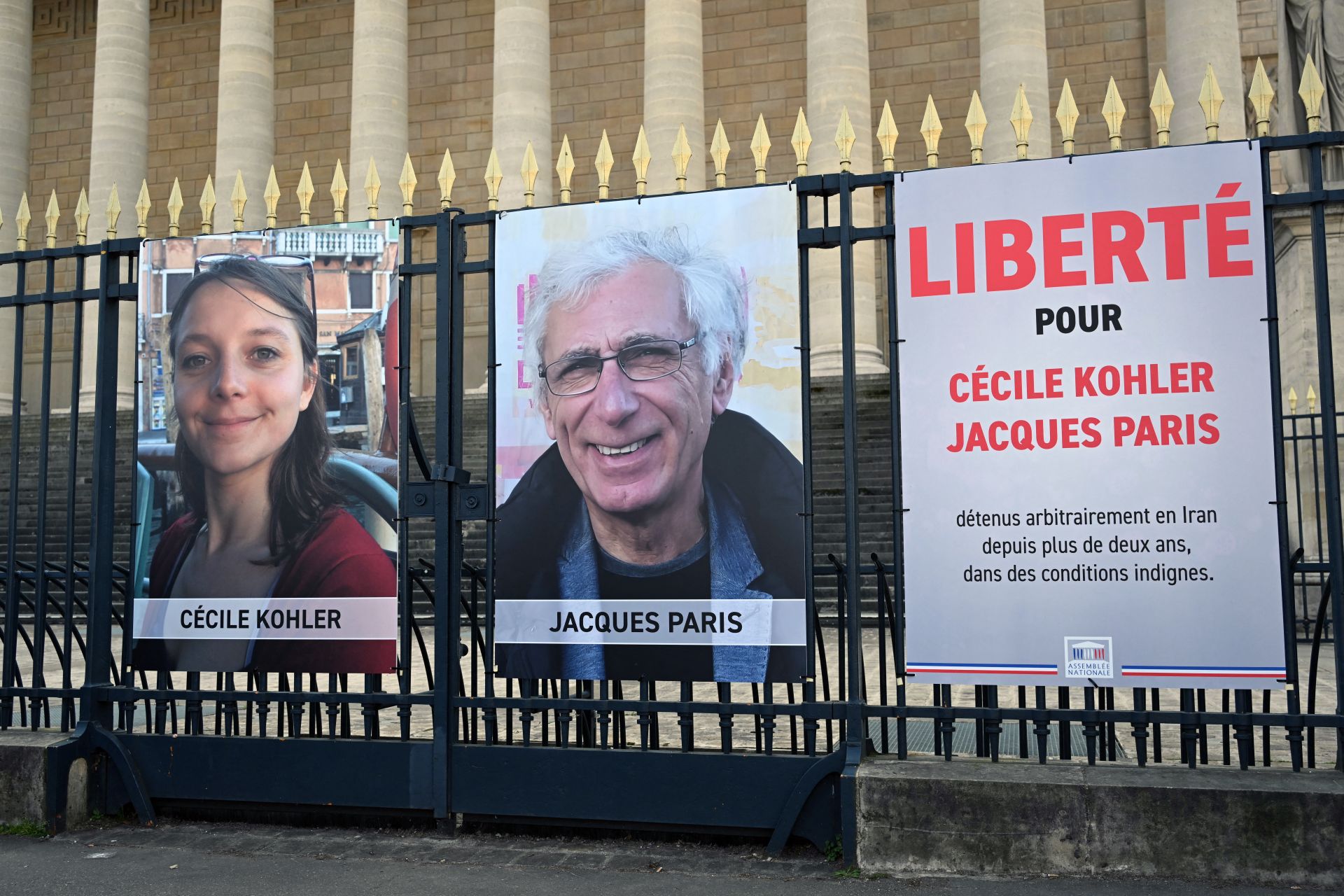- Home
- Middle East
- Iran: “Hostage Diplomacy,” an Intractable Dilemma for the West

This photograph shows the newly displayed portraits of French national Cecile Kohler (L) currently imprisoned in Iran with her partner French national Jacques Paris (C) along with a placard reading "Freedom for Cecile Kohler and Jacques Paris arbitrarily detained in Iran for over two years in appalling conditions" outside the Palais Bourbon, France's National Assembly, following their meeting with the President of France's National Assembly, in Paris, on March 25, 2025. ©Bertrand Guay / AFP
For researchers, aid workers, and even tourists, Iran’s use of detention to extract concessions has become a serious dilemma for Western governments, which so far have failed to stop the practice.
This so-called “hostage diplomacy,” consistently denied by Tehran, re-emerged just after the release on Tuesday of French nationals Cécile Kohler and Jacques Paris, who were freed after more than three years in Iranian custody. The two teachers, accused of espionage, have been placed under judicial supervision at the French Embassy and are awaiting authorization to leave the country.
By coincidence or negotiation, on Wednesday morning Iranian national Mahdieh Esfandiari, previously detained and later prosecuted in France for “promoting terrorism,” left prison for the Iranian embassy in Paris, according to Tehran.
The Islamic Republic had publicly requested her exchange for Kohler and Paris, denouncing her detention as unjust.
“Iran uses hostages as bargaining chips to secure concessions it could not otherwise obtain from the United States and its allies,” Jason Brodsky, policy director at U.S.-based NGO United Against Nuclear Iran, told AFP.
Such concessions, often seen in the past, range from the unfreezing of assets to the release of Iranian citizens, frequently prosecuted or convicted in Europe or the United States for assassination plots or terrorism-related charges.
In 2023, for example, Washington authorized the transfer of six billion dollars in frozen Iranian funds held in South Korea and released five Iranians in exchange for the liberation of five U.S. citizens held at Tehran’s notorious Evin prison.
Likewise, the release of Australian-British academic Kylie Moore-Gilbert in 2020 came after Thailand freed three Iranians jailed for a foiled bomb plot.
A founding act
This strategy is not new; it has long been a pillar of Iran’s foreign policy.
“It is even the founding act that shaped the identity of the Iranian state after the 1979 revolution,” notes Clément Therme, lecturer at the University of Montpellier Paul-Valéry, referring to the U.S. embassy hostage crisis that same year.
On November 4, 1979, around 50 American diplomats were taken hostage at the U.S. embassy in Tehran. Most were not freed until 444 days later after painstaking negotiations, a crisis that contributed to U.S. President Jimmy Carter’s electoral defeat and marked the beginning of 46 years of diplomatic rupture and sanctions.
“Over time, there have been arrests and releases in cycles of rapprochement and tension. The intensity varies, but the practice continues,” Therme says.
“In tense periods like today, Iran stages exchanges for propaganda purposes,” he adds, enabling Tehran to deny it holds hostages, even though it is a signatory to the UN Convention against Hostage-Taking.
Western diplomatic sources say that Iran, heavily sanctioned over its nuclear activities, still holds at least 20 Western nationals, including Iranian-Swedish academic Ahmadreza Djalali, sentenced to death in 2017 for alleged espionage for Israel, accusations his family denies.
British couple Lindsay and Craig Foreman, also accused of espionage, have been detained since January, arrested while traveling through Iran on a global motorcycle trip.
Targeted measures
“Iran is not the only regime using this tactic. Venezuela, Russia, China, and others do as well,” says Daren Nair, a security consultant and hostage-release advocate.
But “the practice keeps expanding because no effective deterrent exists,” he warns, arguing that Western governments should simply prevent their citizens from traveling to Iran.
Another option, argues Jason Brodsky, is stronger targeted measures against Tehran.
“The U.S. government should work with its allies to impose penalties for each hostage taken,” he says, including sanctions, diplomatic isolation, and even a full travel ban on Iranian officials and their families.
AFP
Read more



Comments